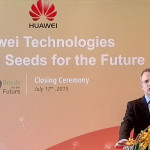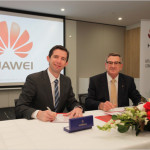news Huawei appears to have become increasingly successful at collaborating with senior figures in the Coalition, as the party gradually warms up to the Chinese manufacturer’s advances.
Huawei has suffered a fraught history with Australia’s political sector over the past decade since it first opened its local operation.
Although the Chinese company is one of the world’s largest suppliers of telecommunications networking equipment and enjoys strong commercial relations with major local customers Optus and Vodafone, as well as other large telcos, its Chinese political connections have landed it in hot water in Canberra time and time again over the past few years.
Throughout the past several years, a number of media outlets and other groups have attempted to link Huawei as a private corporate entity with Chinese political and military interests, citing such claimed links as evidence for why the company may not be suitable as a supplier of telecommunications supplier to major government or private sector projects.
In March 2012, for instance, Labor Attorney-General Nicola Roxon confirmed her department had banned the company from participating in the multi-billion dollar National Broadband Network tendering process, citing national security grounds. The decision was confirmed in late 2013 after the Coalition took power, although Ministers such as Malcolm Turnbull and Andrew Robb — both of whom have visited Huawei facilities in China — expressed concern about the ban.
Huawei has always strongly denied that any undue influence exists on its commercial operations. In addition, no technical proof of any so-called ‘backdoors’ in Huawei’s infrastructure has ever been presented in public. Huawei is also gradually becoming a major consumer electronics brand in Australia (as it is in China), and has retail partnerships with giant local firms such as Woolworths.
And in March this year, the UK Government gave Huawei the all-clear on the security front, with a specialist cyber security evaluation centre having closely examined the company’s equipment.
Since that time, Huawei appears to have continued to make political gains in Australia through working closely with Coalition MPs.
For example, last week Paul Fletcher, the Parliamentary Secretary to Communications Minister Paul Fletcher, visited a Huawei facility in Shenzen, China, to mark the end of a two-week period in which thirteen Australian students travelled to the city to participate in Huawei’s Seeds for the Future program.
And this morning Huawei released a statement noting that Assistant Minister for Education and Training, Senator Simon Birmingham, had helped open Huawei’s new National Training and Development Centre in Sydney. The facility will train locals in the latest technologies, including at least 100 Australian university and vocational education ICT students, as well as Huawei staff and customers currently sent overseas for training.
Senator Birmingham also recently visited Huawei’s executive briefing centre in Beijing.
“Huawei is a global leader in cutting edge technology and has a commitment to upskilling its current and future workforce, as well as the workforce of its clients,” Senator Birmingham said at the time. “Today’s visit to Huawei was an opportunity to discuss the company’s approach to technology development, training deployment and improving the capability of its staff and partners.”
Its unclear the extent to which the positive security assessment Huawei has received in the UK and its increasing political connections and investment in Australia are having an impact on the company’s fortunes with the Federal Government.
The company may be facing a new commercial threat in the form of pending legislation which may affect the ability of telcos to purchase its equipment. The legislation has been in development by the Attorney-General’s Department for at least a year and is dubbed the Telecommunications Sector Security Reforms or TSSR, although the actual exposure draft of the bill released last month is named the Telecommunications and Other Legislation Amendment Bill 2015.
The bill has been widely interpreted as giving the Government power over purchasing decisions made by telcos. This could, for example, give the Attorney-General’s Department the power to stop telcos such as Vodafone and Optus from buying hardware from Chinese suppliers such as Huawei.
opinion/analysis
What we’re seeing here is very clear: Huawei is taking every step possible to convince the Government, through a systematic lobbying effort, that it is a legitimate commercial operation and should be treated the same way that existing suppliers such as Ericsson, Nokia-Siemens Networks and Alcatel-Lucent are.
And rightfully so. There has never been a shred of hard evidence presented in public that the company’s networking equipment is suspect and subject to Chinese political and/or military interference; on the contrary, as the UK security assessment has demonstrated, Huawei’s gear would appear to be entirely clean. At the same time, the company has acted as a strongly competitive force to drive down prices in its markets. There’s a reason it is picking up major contracts with the likes of Optus and Vodafone — because its products are good and competitively priced.
On the flip side, US networking giant Cisco has never been viewed as a particularly sensitive company in Australia, despite the fact that it is now documented that the US National Security Agency has a habit of intercepting Cisco’s routers and inserting the agency’s own monitoring devices. Go figure.
I suspect what we will see from here is gradual and increasing pressure on the Federal Government to abandon its antagonism towards Huawei. How long can the Government treat a commercial company this way without providing evidence for why it is doing so?
Image credit: Huawei








I’ve been dealing with Huawei for a few years now. Their equipment is pretty solid and can suit almost any business need. They have two major shortcomings with regards to tackling the Australian market:
1 – They are too expensive. Huawei tend to come in more expensive than HP or Juniper – both of who are far more established in the market. If they want to take out entrenched players they are going to have to take it on the chin with regards to pricing until they get established.
2 – They are arrogant. So arrogant. Most of their execs and product managers have come to Australia from China, a market where they are heavily dominant. This has given them a feeling that they are “the one to beat” rather than a new player in a busy field. This makes doing business with them very painful.
There is no reason why Huawei shouldn’t succeed in our market but they will need to make some internal changes if they wish to do so.
As for the security bit, that’s BS. In addition to extensive 3rd party testing that has been done around the world, the reality is that the majority of their infrastructure will be sitting behind security infrastructure supplied by different vendors. If a device ever tried to “phone home” it would be quickly detected and the whole game would be given away. Cisco was such a prime target as they are the de facto border device for almost every Telco around the world (i.e. they sit outside the Firewall)
Huawei, basically rip off and copy other products as claim them as their own.
research…
Huawei Admits Copying Code From Cisco in Router Software
http://www.wsj.com/articles/SB10485560675556000
even on their wikipedia page:
https://en.wikipedia.org/wiki/Huawei
under “Intellectual property rights” numerous times they have “stolen”/ “copied” others work.
for me they cannot be trusted, anything they get their hands on they copy…
[Deleted by Renai]
hey mate,
the article you quote is from 2003 … 12 years ago. It was one case, and there is little reason to Huawei is engaged in that anymore.
FYI I have also deleted a sentence from your comment due to it consisting of objectionable content.
Kind regards,
Renai
Comments are closed.